Living Bigger than Your Goals, Bigger than Yourself – Your Mission
A reflection on Relationship, Connection, Trust
Around the new year, I reflect on the past year and reevaluate my direction for the new year. This year, I’m clear that I’ve made a lot of progress on my goals, and yet they are big enough that I’m still working toward them. Sometimes it takes years or even a lifetime of revisiting and refining the same things to accomplish the things that are really important to us. That’s what it is like to live your mission. What is your mission?
My mission is connection. Connection to myself, to others, to my community, and to the world as a whole. And partly because we teach what we need to learn for ourselves and because I want to share the gifts and lessons I’ve
received in my life, much of the way I work with individuals, couples, and groups invites people into deeper connection with themselves, each other, and the world as well. Your mission may be different, yet I’d bet there is something in what I’m learning about living my mission that will help you with your mission as well. (Or if nothing else, you might find some ideas that help with your relationships.)
In recent years, I’ve learned that the two biggest things that hold me back are fear and lack of trust (which are closely related by the way). So when I stumbled on a video of Brene Brown outlining what it really takes to trust, I ate it up. It shined a spotlight on where I’ve been falling short in my mission and inspired me to take more responsibility for trusting and connecting – both to myself and others. Wait, so what is trust?
Charles Feltman defines trust as this: “Choosing to make something important to you vulnerable to the actions of someone else.” And his definition of distrust follows with, “what I have chosen to share with you that is important to me is not safe with you.” Wow. That is clear. So , how we you trust, really?
To learn how to trust, Brene Brown dug into her own research and research by as well-known relationship expert John Gottman. Gottman says: trust is built in small moments over time. Stopping what you are doing to attend to someone in need or pick up the phone to check in when you are thinking about someone and asking about specific things you know are important to them builds trust and connection. Failure to choose connection and support when the opportunity is there is a betrayal of trust and relationship.
Another surprising finding is that asking people for help when needed helps prove trustworthiness. It shows we won’t take on more than we can handle and we will ask for help when we do. When we don’t do this, people won’t come to us because they don’t believe we can handle what they want to ask or share. This one was huge for me and speaks so much about honoring ourselves and our limits and boundaries.
Diving deeper into trust, we see when we trust, we are BRAVING connection. With ourselves and with others. Brene Brown came up with the acronym BRAVING to describe in more detail the components of trust.
B – Boundaries – When I know your boundaries, and you hold them, and you know my boundaries and respect them, there can be trust. Without clear boundaries and respect of boundaries, there is distrust. Boundaries create safety; safety creates trust. Its why we build fences and walls. So much more can be said about this, I’ll save it for a future post.
R – Reliability – There can only be trust if you do what you say you are going to do and I do what I say I’m going to do consistently over time, not just once. How many times do we not do what we say we will do. “It was really great seeing you. Let’s get together again soon for lunch.” And it never happens? I know it’s just a saying and everyone says it, but trust is broken. Let’s just share the awkwardness of knowing it may be a while before we meet again. Being reliable creates trust.
A – Accountability – You are allowed to make mistakes. I can only trust you if when you make a mistake you are willing to own it and make amends and you can only trust me if I am allowed to make a mistake, be honest about it, and make amends. Being accountable creates trust.
V – Vault – What I share with you, you will hold in confidence. What you share with me I will hold in confidence. When we gossip about someone sharing something that is not ours to share, we think we are connecting over juicy information, but we are proving ourselves untrustworthy. Keeping confidence creates trust.
I – Integrity – I cannot be in a trusting relationship with you unless you act from a place of integrity and encourage me to do the same. What is integrity? Doing what is right, even when nobody else is looking. Brene’s definition is far more challenging and eloquent. “Choosing courage over comfort. Choosing what is right over what is fun, fast or easy. Practicing your values, not just professing your values.” Let’s meet each other in integrity. Being in integrity creates trust.
N – Non-Judgement – I can fall apart, ask for help, struggle, suffer, and make mistakes without being judged by you and you will find the same with me. Without this, we can’t be safe to ask for help and we can’t truly reciprocate it. When we assign a value to reaching out or needing help by thinking less of the other person or judging them in any way for what they are doing or feeling it destroys trust. Or even more importantly when we think less of ourselves for reaching out or needing help, we are consciously or unconsciously thinking less of the other person for their needing help. You can’t have true trust if you are judging the other person, or ourselves in big or small ways. Acceptance creates trust.
G – Generosity. Our relationship is only trusting if you can assume the most generous thing about me and my intentions and then check in about it if it doesn’t feel right. I will do the same for you to help us both stay in integrity. There is a lack of trust when we assume poor intentions and don’t check it out with the other person. Assuming positive intentions and having unconditional positive regard creates trust.
Building trust, strengthening the weak spots, and sharing about breakdowns in trust facilitates connection. Trust makes connection easy.
And these same principles apply to trusting and connecting with ourselves as well as trusting and connecting with someone else. Looking at ourselves: How well do we know our own boundaries and honor them? How often do we do what we tell ourselves we are going to do? How good are we at admitting and forgiving ourselves for our mistakes and shortcomings? How good are we at choosing who to share with and how much is in our best interest to share? Are we in integrity with ourselves and our value? Can we refrain from judging and being critical of our thoughts and actions? Do we assume that we are doing our best and had positive intentions? By these measures, do we really trust ourselves? Can we achieve our mission if we don’t trust ourselves?
When we become aware we are not trusting or in connection with ourselves, reflecting on these definitions can give us benchmarks. This map shows us where our obstacles are to deeper relationship, trust, and connection are happening so we can name it, repair it, and ask for what we need from ourselves and from others.
To tie this all together: Do you know your mission? Are you living it? In every small moment? Can you achieve your mission alone or is it so big do you need the help and support of others? You probably need strong relationship with yourself and others to achieve your mission. Do you have strong relationship and connection with yourself and others? Do you trust yourself to achieve your mission? Do you trust others to help? If not, where are your obstacles?
Thanks for joining me on this small part of my mission. Will you join me for more?
Chuck Hancock, M.Ed, LPC is a Licensed Professional Counselor in the state of CO. He has completed comprehensive training in the Hakomi Method of Experiential Psychotherapy, a mindfulness mind-body centered approach. Chuck guides individuals and groups in self-exploration providing them with insight and tools for change. He also incorporates nature as a therapy tool to help shift perspective and inspire new patterns.

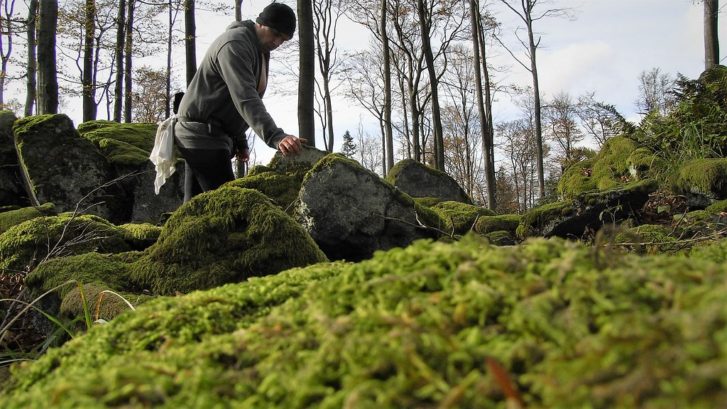
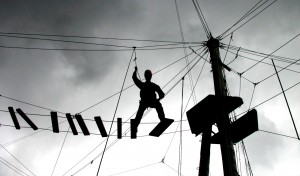
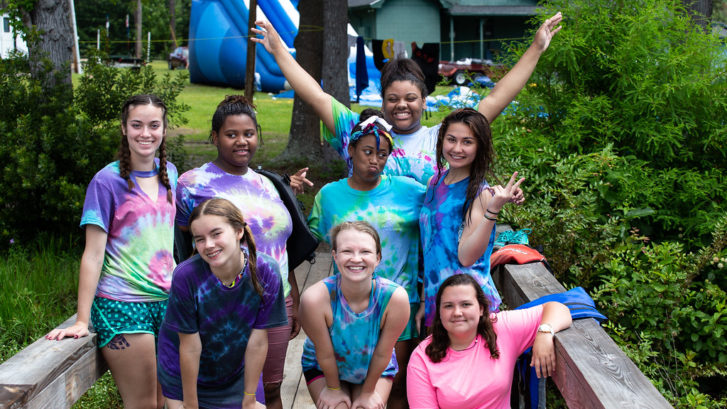
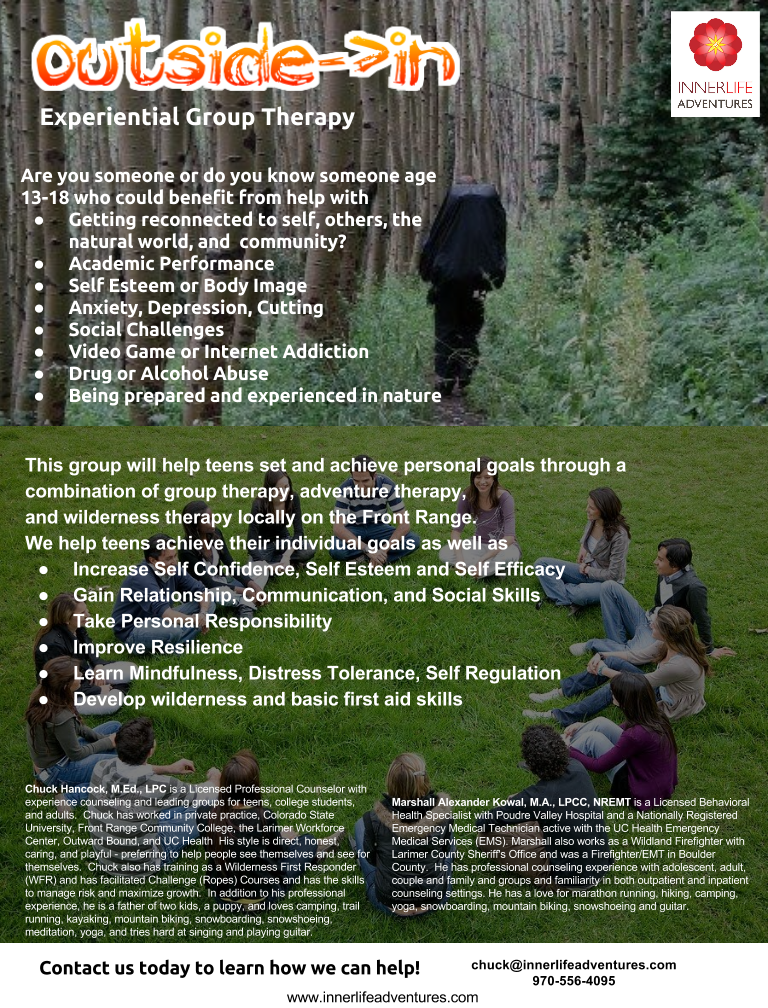

 1. People who go to therapy are not crazy. You are not crazy.
1. People who go to therapy are not crazy. You are not crazy. 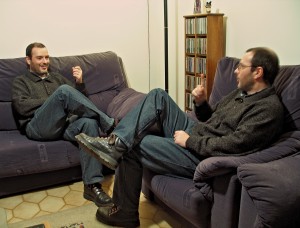 reflections of what you are saying, what it seems like you are saying that you are not aware of, and questions to help you get more clear, but your life is yours to live.
reflections of what you are saying, what it seems like you are saying that you are not aware of, and questions to help you get more clear, but your life is yours to live.
